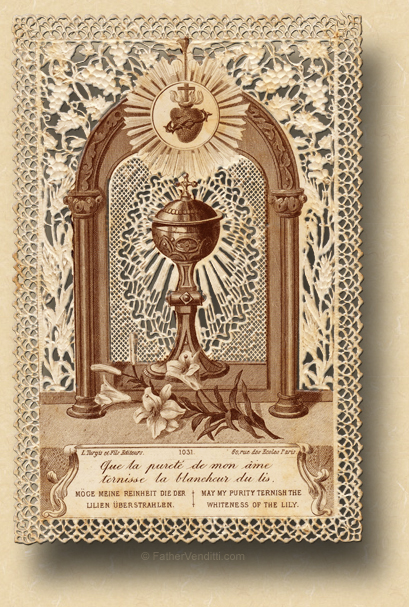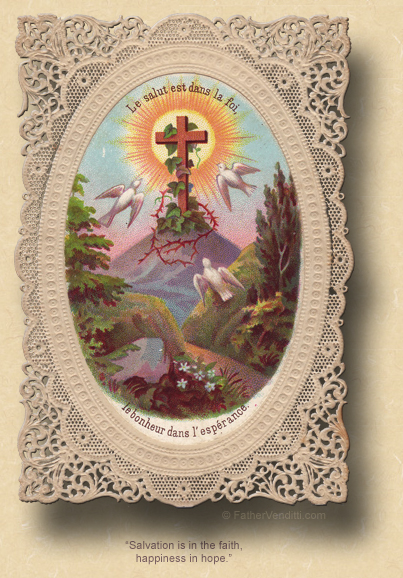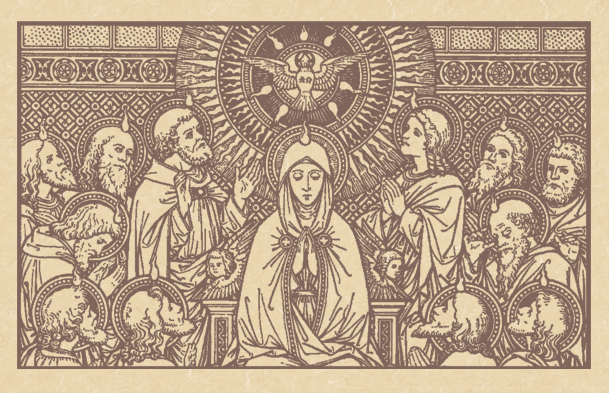From Ascension to Pentecost.
The Memorial of Saint Charles Lwanga & Companions, Martyrs.
Lessons from the feria (the Seventh Monday of Easter), according to the ordinary form of the Roman Rite:
• Acts 19: 1-8.
• Psalm 68: 2-7.
• John 16: 29-33.
|
… or, from the proper:
• Maccabees 7: 1-2, 9-14.
• Psalm 124: 2-5, 7-8.
• Matthew 5: 1-12.
… or, any lessons from the common of Several Martyrs in Easter Time.
|
The Monday after the Ascension.
Lessons from the feast,* according to the extraordinary form of the Roman Rite:
• Acts 1: 1-11.
• [The Gradual is omitted.]
• Mark 16: 14-20.
FatherVenditti.com
|
 6:41 PM 6/3/2019 — We begin with recognizing the importance of the saints commemorated in today’s memorial, the story of whom is only very generally known, probably because it’s a very politically incorrect story. In the late 19th century, the king of Uganda launched a vicious persecution of the Church in his country in response, mostly, to the Church’s open hostility to the culture of homosexuality. Charles Lwanga was the master of the king’s pages, and was also a Catholic who persuaded the young pages of whom he had charge to refuse the homosexual advances of the king and his courtiers. As a result, he and fourteen of his fellow pages were put to death on June 3rd, 1886, with many more Ugandan Catholics in the persecution which followed for a full year. Saint Charles himself is the patron saint of the African Catholic Youth Action movement, though he should really be the patron saint of the purity of the young, along with Maria Goretti, since that’s what he died for. 6:41 PM 6/3/2019 — We begin with recognizing the importance of the saints commemorated in today’s memorial, the story of whom is only very generally known, probably because it’s a very politically incorrect story. In the late 19th century, the king of Uganda launched a vicious persecution of the Church in his country in response, mostly, to the Church’s open hostility to the culture of homosexuality. Charles Lwanga was the master of the king’s pages, and was also a Catholic who persuaded the young pages of whom he had charge to refuse the homosexual advances of the king and his courtiers. As a result, he and fourteen of his fellow pages were put to death on June 3rd, 1886, with many more Ugandan Catholics in the persecution which followed for a full year. Saint Charles himself is the patron saint of the African Catholic Youth Action movement, though he should really be the patron saint of the purity of the young, along with Maria Goretti, since that’s what he died for.
With the feast of the Ascension behind us now, Holy Mother Church begins to gear-up for Pentecost. In our First lesson, Paul and Apollo are crisscrossing Greece preaching the Gospel. Apollo, remember, was a very articulate disciple of Christ whose formation in the faith was incomplete, and who had been preaching the baptism of John, until Paul and his companions explain the new developments to him, and he becomes an even more effective evangelist for Christ. Today we see Paul encountering more Christians in Ephesus who also have received only the symbolic baptism of John, and who know nothing of the Holy Spirit. Saint Luke’s comment that, as soon as they were baptized in the name of the Lord Jesus, the Holy Spirit came upon them and they spoke in tongues, is clearly a throwback to the first Pentecost, and serves liturgically for us as a preview of what we will celebrate on Sunday.
But there’s another peculiar theme floating around in the lessons of today’s Mass having to do with the idea of being scattered. Our Psalm, Psalm 68, is familiar to me because it’s an integral part of the first service of Easter morning in the Byzantine Tradition called Resurrection Matins. Having processed around the outside of the church three times, everyone stands before the sealed doors of the Church, and the priest sings this Psalm just before opening them: “God arises; his enemies are scattered, and those who hate him flee before him” (v. 2 RM3). But in the Gospel lesson our Lord, Himself, says we will be scattered, and will leave Him alone. Msgr. Knox makes the verse a little clearer than it’s given here: “Behold, the time is coming, nay, has already come, when you are to be scattered, each of you taking his own path, and to leave me alone” (John 16: 32 Knox);  which, of course, is exactly what happened on the evening of Holy Thursday when Christ was arrested and his disciples all scattered. which, of course, is exactly what happened on the evening of Holy Thursday when Christ was arrested and his disciples all scattered.
But notice the subtle thread that links all these verses together and points them in the direction of Pentecost. It actually begins way back in Genesis 11 when the descendants of Adam and Eve decide to build a giant tower to accentuate their greatness, forgetting that everything they have comes from God. And the Scriptures tell us: “That is why it was called Babel, because there the Lord confused the speech of all the world. From there the Lord scattered them over all the earth” (v. 9 NAMRE); the irony being that man went from unity of language to multiplicity of language without understanding because of his arrogance, then, at Pentecost—and with all subsequent laying on of hands and baptisms, as in today’s first lesson—the Holy Spirit descends resulting in everyone speaking in tongues, but with understanding, as the gift of tongues is always accompanied by someone who is able to interpret.
It all culminates in the very last verse of today’s Gospel lesson, in which our Lord says, “In the world you will have trouble, but take courage, I have conquered the world” (John 16: 33 RM3). When we despair of life, when we find ourselves on the verge of losing hope, we are very much like the so-called disciples of our Lord Paul met in Ephesus who told him, “We have never even heard that there is a Holy Spirit” (Acts 19: 2 RM3). That’s the key to understanding the mysterious “unforgivable sin” against the Holy Spirit from Matthew 12 that everybody is always so confused about. The sin against the Holy Spirit is despair, the abandonment of the virtue of Hope. And it’s toward that virtue that these days between Ascension and Pentecost are pointing us: at the moment of His Ascension, our Lord promised us that, while we can’t follow him to where He’s going right now, we will eventually; and, at Pentecost He gave us all the gifts we would ever need to see the journey of life through successfully, transmitted to us through our baptism and all the other subsequent sacraments.
In this Mass, let’s ask our Blessed Lord, through the intercession of Charles Lwanga and his friends, that we will practice the virtue of Hope by staying strong and true before all the obstacles that come our way.

* In the extraordinary form, on ferias of the Ascension season, the lessons from the Feast of the Ascension are repeated.
|

